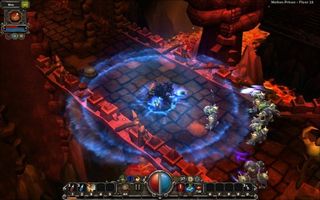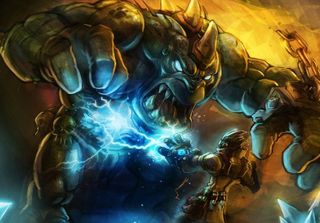“Somebody struck on the idea of doing a small test game, the canary in the mineshaft, to prove Hellgate's network tech in front of the launch,” says Baldree, now president of Runic Games. “So I got the opportunity to work on that remotely. What became Mythos was just me, working out of my house. I was Flagship Seattle for about six months.”
It became quickly apparent that Mythos had potential.
“There was some talk around the office that this was the game we should have been making in the first place,” says Erich Schaefer, brother of Max and Runic Games' chief creative officer. “So we said, let's turn this into a real project – it'll still work as a network test, but let's staff it up and make it into a real game.”
But even with that decision made, the future of Mythos seemed far from certain.
“For the entire time we were making that game we were essentially putting a square peg into a round hole,” says Max Schaefer. “It was rough – it's not how you'd want to make a game.”

“It was not a normal development cycle,” agrees Baldree. “There was a lot of reassessment of game features. The game changed significantly over the course of its life as expectations changed. Initially it really was supposed to be a one person project, and the scale was based around that, and as it grew we had more people and more energy to invest.”
And then, just as the project approached beta, Flagship came apart entirely. The Mythos team lost everything they'd worked on, with the game's IP and assets promptly sold off to South Korean MMO publisher HanbitSoft. Not a single pixel or line of code could be rescued.
PC Gamer Newsletter
Sign up to get the best content of the week, and great gaming deals, as picked by the editors.
It was “horribly demoralising,” Max Schaefer admits. “These guys had put a couple of years of work into Mythos and, boy, it was just snatched away at the last minute. It was a really horrible time. You could see it crashing like a train in slow motion. It didn't happen overnight. It was hard to watch. In the later stages of blowing up, I was saying to my brother, we've got to take a year off after this and decompress. But then we realised that we'd lose the team unless we jumped on it and made something happen.”

“The day after Flagship shut down, everyone got together in my back yard and said, hey, we're going to start up again,” says Baldree. “So we moved about five blocks, bought all our old equipment at liquidation and started Runic. We were incorporated within the month – and that was only because of the paperwork.”
“My brother, myself and Peter Hu [another Diablo II and Hellgate stalwart, now Runic's CTO] threw in some money just to keep the door open and set about looking for a publisher,” says Max. “We wanted to do something quickly – partly to get money in the door, but mostly just to get something on the shelves so the guys could clear the whole Mythos tragedy out of their heads.”
“By the end of Mythos's development we really knew what we wanted to be doing,” says Baldree. “We'd bumped into most of the walls we were going to bump into, faced most of the pitfalls. We had a pretty good idea of what would make a successful MMO action-RPG. In starting Runic, one of the big lessons from Flagship was not to attempt more than you can safely complete. So right from the beginning we talked about having an intermediate step: we'd do a singleplayer first, get our feet under us.”
“There were advantages to starting over, although it was painful,” says Erich Schaefer. “All Mythos's technology started with Hellgate and it wasn't really appropriate. The graphics engine was designed with Hellgate's over-the-shoulder perspective in mind. Even though it took a little time to ramp up with Torchlight, we could make stuff that was more appropriate for us. Better performance is one obvious result.”

“We put a lot of emphasis right at the start on good development tools,” says Max. “We had an ambitious schedule, so we set out to make tools that would make everyone as productive as possible – and because we'd already had a dry run at making this game, everyone had a wishlist of things that would make their tools that much better. Level designers could test levels and quests in the editor without having to bug a programmer. That really sped up development. Secondly we set out to make a game that would run on everyone's machines. Low minimum specs were a big, big point for us.”
“We ended up using the Ogre 3D engine, which is open source,” says Baldree. “It doesn't really cost anything, and it's got really great support for older hardware. And given the size of the development team we didn't want to spend a ton of time developing the latest pixel shader for a graphics card that only 20 or 30 people have.”
The result is something that the team refers to as an AAA-casual title – a small, polished creation that matches the production values of major developments with the economic ethos and accessibility of indie development. Baldree points to a gap in the market for quality 'impulse buy' games outside the myriad Bejeweled clones. Lower price points and easy digital distribution also make it a more appealing prospect in these days of high piracy concerns.
“We were rebelling against the whole five-year 30-million-dollar project,” says Max Schaefer. “Partly because it had just blown up our company, obviously – but also I don't think it serves gamers all that well. You just don't get that many games coming out. I mean, what's it been? Nearly ten years since the last Diablo? And part of it is because the giant scope and budget of each project. I don't think it really results in substantially better games. Obviously WoW is an exception, and there are others. But as game makers we kind of feel that more ideas and faster projects are better for our psyches. So we thought there was a gap in the market in between casual games and these bloated Hollywood-style projects, which would give people good gaming experiences, and new ideas without taking five years and costing 50 bucks for the consumer.”
Hey folks, beloved mascot Coconut Monkey here representing the collective PC Gamer editorial team, who worked together to write this article! PC Gamer is the global authority on PC games—starting in 1993 with the magazine, and then in 2010 with this website you're currently reading. We have writers across the US, UK and Australia, who you can read about here.
Most Popular


